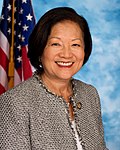Senate
| Senator | Party | State | Term | Sect (School) | Notes | ||||
|---|---|---|---|---|---|---|---|---|---|
| Start | End | Length of service | |||||||
 | Mazie Hirono | Democratic | Hawaii | January 3, 2013 | Incumbent | 13 years, 14 days | Jodo Shu (Pure Land) [2] | First Buddhist senator [3] [4] | |
This is a list of Buddhist members of the United States Congress .
As of 2025 [update] , four Buddhists have been elected to Congress, the first being both Mazie Hirono and Hank Johnson in 2007. As of the 119th Congress, three Buddhists currently serve in Congress, two in the House of Representatives and one in the Senate. All being members of the Democratic Party. [1]
| Senator | Party | State | Term | Sect (School) | Notes | ||||
|---|---|---|---|---|---|---|---|---|---|
| Start | End | Length of service | |||||||
 | Mazie Hirono | Democratic | Hawaii | January 3, 2013 | Incumbent | 13 years, 14 days | Jodo Shu (Pure Land) [2] | First Buddhist senator [3] [4] | |
| Representative | Party | District | Term | Sect (School) | Notes | ||||
|---|---|---|---|---|---|---|---|---|---|
| Start | End | Length of service | |||||||
 | Mazie Hirono | Democratic | HI-02 | January 3, 2007 | January 3, 2013 | 6 years, 0 days | Jodo Shu (Pure Land) [2] | One of the first two Buddhists in Congress. Retired to run successfully for U.S. Senator from Hawaii. [3] [4] | |
 | Hank Johnson | Democratic | GA-04 | January 3, 2007 | Incumbent | 19 years, 14 days | Soka Gakkai (Nichiren) [5] [6] | One of the first two Buddhists in Congress [7] | |
 | Colleen Hanabusa | Democratic | HI-01 | January 3, 2011 | January 3, 2015 | 4 years, 0 days | Jodo Shinshu (Pure Land) [8] | Retired to run unsuccessfully for U.S. Senator from Hawaii. [9] | |
| November 14, 2016 | January 3, 2019 | 2 years, 50 days | Elected in special election to succeed Mark Takai, who died in office Retired to run unsuccessfully for governor of Hawaii | ||||||
 | Derek Tran | Democratic | CA-45 | January 3, 2025 | Incumbent | 1 year, 14 days | Unspecified [10] [11] [12] | Tran has not specified a specific school or sect, but has spoken at Vietnamese Buddhist temples, a tradition that is usually Mahayana, [13] and in defense of prosecuted Vietnamese Buddhist officials. [14] | |
A number of members of the United States Congress who do not formally affiliate with or have a background of Buddhism varyingly engage with Buddhist practices like mindfulness, meditation and studying the Buddhist Dharma; notably United States Representative from SC-1, Mark Sanford (R), engaged with and spoke about Buddhism [15] [16] and stated that his friend told him he was "becoming a Buddhist Christian" [17] , with his own staffers reportedly telling FITSNews that "it seemed to me he [Sanford] was both Christian and Buddhist." [18] However, Sanford did refute claims he had formally converted to Buddhism. [19]
Former Congressman Tim Ryan (D) of Ohio also engaged with Buddhist practices through a secular lens; Ryan, formally a Roman Catholic, regularly engaged with Buddhist meditation and mindfulness; writing A Mindful Nation in 2012 [20] [21] and speaking about his practice regularly throughout his career, as well as encouraging his fellow Congressmembers to try meditation [16] as well as securing federal funding for a meditation program for schools in his district. [16] However, Ryan, similarly to Sanford, has stated he is still a Catholic. [22]
The number of Buddhists in Congress fell from three to two, as Rep. Colleen Hanabusa, D-Hawaii, lost her bid for a Senate seat.